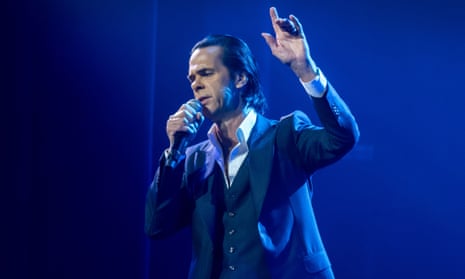Are AI-generated songs a ‘grotesque mockery’ of humanity or simply an opportunity to make a new kind of music?
Written by WOM writer on January 20, 2023
Nick Cave has condemned a song designed and directed by ChatGPT. But new technology should be embraced, not feared
 Nick Cave performing at Melbourne’s Palais Theatre, 30 November 2022. The singer-songwriter described an AI-written song as ‘a replication, a kind of burlesque’. Photograph: Richard Nicholson/REX/Shutterstock
Nick Cave performing at Melbourne’s Palais Theatre, 30 November 2022. The singer-songwriter described an AI-written song as ‘a replication, a kind of burlesque’. Photograph: Richard Nicholson/REX/Shutterstock
Earlier this week, a fan called Mark sent, for reasons not entirely clear, Nick Cave some lyrics written “in the style of Nick Cave” by the ChatGPT AI system.
Suffice to say Cave was not pleased by the algorithmic imitation.
“With all the love and respect in the world, this song is bullshit, a grotesque mockery of what it is to be human, and, well, I don’t much like it.”
Fair enough: Why would he?
But Cave’s response on his Red Hand Files blog raises issues relevant to all of us, as we contemplate what the AI revolution means to our own lives and careers.
For Cave, ChatGPT could not write “a genuine song” but only “a replication, a kind of burlesque.” That’s because, he says, real songs arise from “the complex, internal human struggle of creation”:
This is what we humble humans can offer, that AI can only mimic, the transcendent journey of the artist that forever grapples with his or her own shortcomings. This is where human genius resides, deeply embedded within, yet reaching beyond, those limitations.”
Now, artists have fretted about the stifling effects of technology since time immemorial.
Back in 1906, the composer John Philip Sousa polemicised, in very familiar terms, against a futuristic invention called the phonograph.
“Heretofore, the whole course of music, from its first day to this”, Sousa said, “has been along the line of making it the expression of soul states. Now, in this the 20th century, come these talking and playing machines, and offer again to reduce the expression of music to a mathematical system of megaphones, wheels, cogs, disks, cylinders.”
You can find similar denunciations of electric guitars, synthesisers, drum machines, Auto-Tune and almost every new development in the making or recording of songs.
Yet, again and again, people have discovered ways to employ the technology in exciting, creative ways.
Think of the golden age of hip-hop: how producers deployed sampling – a technique many condemned as sheer plagiarism – to make a totally fresh kind of music.
That example – particularly, the subsequent legal constraints on sampling – also illustrates how the possibilities associated with a particular technology depend on the social and economic context in which it emerges.
After all, most pop songs aren’t the result of individual geniuses, and haven’t been for a very long time. As far back as 1910, the New York Times could publish a piece entitled “How Popular Song Factories Manufacture a Hit”.
“Nowadays,” it explained, “the consumption of songs by the masses in America is as constant as their consumption of shoes, and the demand is similarly met by factory output.”
Then, as now, corporations in a cut-throat business adopted whatever methods might make the most money as quickly as possible.
To disrupt pop music – and many other fields as well – AI doesn’t need to manifest genius. It just needs to be good enough so that its cheapness relative to human labour overrides any perceived decline in quality.
A few years ago, in his book The Song Machine, John Seabrook chronicled how Swedish producers like Denniz Pop, Max Martin, Dr Luke and others transformed contemporary music. To create iconic songs for the likes of Taylor Swift, Rihanna, Katy Perry and Beyoncé, production wizards begin with simple chord progressions on laptops, circulate the files to a vast array of singers, melody makers, hook writers, lyricists and taste makers, and then mix digital takes from multiple contributors into a seamless whole.
David Hajdu of The Nation describes the method as not so much industrial as post-industrial, since it involves “mining the vast digital repository of recordings of the past, or by emulating or referencing them through synthesis, and then manipulating them and mashing them up.”
AI suits this kind of songwriting perfectly.
Famously, Max Martin gave Britney Spears the alarming lyric “Hit me baby one more time” because, as a non-native English speaker, he misunderstood teen slang for text messaging. Yet, as the songwriter Ulf Ekberg explained, “it was to our advantage that English was not our mother language because we are able to treat English very respectless, and just look for the word that sounded good with the melody”.
Does anyone really think Martin and his team wouldn’t have made use of ChatGPT, had the software been around back then?
None of this implies that AI constitutes an obstacle, in and of itself, to musical creation. The problem lies less with the technology than with a social system that immediately orients every innovation into profit making, irrespective of the consequences for art or society.
If there’s money to be made in AI-generated songs “in the style of Nick Cave”, then that’s what we’ll get, no matter how sub par the results.
That probably won’t affect Cave himself very much, given the loyalty of his fanbase. But the same logic applied elsewhere threatens devastating consequences for ordinary people.
After all, an AI doesn’t have to be a genius to put you out of work. It just needs to be adequate – and slightly cheaper.
… we have a small favour to ask. Tens of millions have placed their trust in the Guardian’s fearless journalism since we started publishing 200 years ago, turning to us in moments of crisis, uncertainty, solidarity and hope. More than 1.5 million supporters, from 180 countries, now power us financially – keeping us open to all, and fiercely independent. Will you make a difference and support us too?
Unlike many others, the Guardian has no shareholders and no billionaire owner. Just the determination and passion to deliver high-impact global reporting, always free from commercial or political influence. Reporting like this is vital for democracy, for fairness and to demand better from the powerful.
And we provide all this for free, for everyone to read. We do this because we believe in information equality. Greater numbers of people can keep track of the global events shaping our world, understand their impact on people and communities, and become inspired to take meaningful action. Millions can benefit from open access to quality, truthful news, regardless of their ability to pay for it.
Source: Jeff Sparrow – theguardian.com
Image: freepik.es




